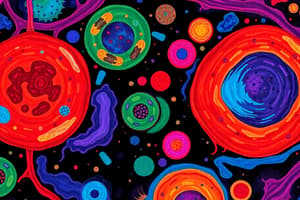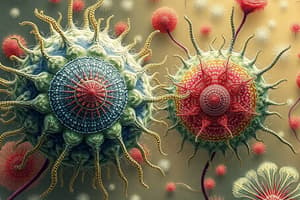Podcast
Questions and Answers
Which factor primarily determines the metabolic processes within cells in an ecosystem?
Which factor primarily determines the metabolic processes within cells in an ecosystem?
- Climate zones
- Biodiversity
- Environmental factors (correct)
- Human activities
What role do cellular processes, such as photosynthesis, play in an ecosystem?
What role do cellular processes, such as photosynthesis, play in an ecosystem?
- They influence human activities.
- They eliminate pollution.
- They convert chemical energy to light energy.
- They serve as the base for food webs. (correct)
How do evolutionary pressures affect cells in organisms?
How do evolutionary pressures affect cells in organisms?
- They lead to the development of species-specific traits. (correct)
- They increase biodiversity within a species.
- They promote uniformity among all cells.
- They cause cells to function independently of the environment.
Which of the following is a human activity impacting ecosystems?
Which of the following is a human activity impacting ecosystems?
What is the relationship between climate change and cellular processes?
What is the relationship between climate change and cellular processes?
What distinguishes prokaryotic cells from eukaryotic cells?
What distinguishes prokaryotic cells from eukaryotic cells?
Which organelle is primarily responsible for energy production in a eukaryotic cell?
Which organelle is primarily responsible for energy production in a eukaryotic cell?
What is the primary function of the cell membrane in a cellular context?
What is the primary function of the cell membrane in a cellular context?
In ecological terms, what defines a community?
In ecological terms, what defines a community?
Which of the following best describes competition in an ecological context?
Which of the following best describes competition in an ecological context?
What is the role of enzymes in cellular processes?
What is the role of enzymes in cellular processes?
What is mutualism in ecological interactions?
What is mutualism in ecological interactions?
How do nutrients cycle through an ecosystem?
How do nutrients cycle through an ecosystem?
Flashcards
Prokaryotic Cell
Prokaryotic Cell
A type of cell lacking a nucleus and membrane-bound organelles; examples include bacteria and archaea.
Eukaryotic Cell
Eukaryotic Cell
A type of cell containing a nucleus and membrane-bound organelles; examples include plant, animal, fungi, and protist cells.
Organelle
Organelle
A specialized structure within a eukaryotic cell that performs a specific function.
Ecosystem
Ecosystem
Signup and view all the flashcards
Population
Population
Signup and view all the flashcards
Competition
Competition
Signup and view all the flashcards
Predation
Predation
Signup and view all the flashcards
Symbiosis
Symbiosis
Signup and view all the flashcards
Ecosystem Factors
Ecosystem Factors
Signup and view all the flashcards
Photosynthesis
Photosynthesis
Signup and view all the flashcards
Cellular Function & Environment
Cellular Function & Environment
Signup and view all the flashcards
Organism Adaptation
Organism Adaptation
Signup and view all the flashcards
Ecology & Cell Biology Connection
Ecology & Cell Biology Connection
Signup and view all the flashcards
Study Notes
Cell Biology
- Cells are the fundamental units of life, exhibiting a remarkable diversity of structures and functions.
- Prokaryotic cells (bacteria and archaea) lack a nucleus and other membrane-bound organelles, while eukaryotic cells (plants, animals, fungi, and protists) possess a nucleus and these organelles.
- The structure of a eukaryotic cell is compartmentalized, with different organelles performing specific tasks.
- Examples of organelles include the nucleus (containing DNA), mitochondria (powerhouse of the cell), endoplasmic reticulum (protein synthesis and lipid metabolism), Golgi apparatus (protein processing and sorting), and lysosomes (waste disposal).
- The cell membrane, a selectively permeable barrier, regulates the passage of substances into and out of the cell.
- Cell division (mitosis and meiosis) is crucial for growth, repair, and reproduction in multicellular organisms.
- Cell signaling pathways allow cells to communicate with each other and respond to environmental stimuli.
- Important cellular processes include protein synthesis (transcription and translation), metabolism (energy production and utilization), and DNA replication.
- Cellular processes are governed by enzymes and tightly regulated pathways.
Ecology
- Ecology studies the relationships between organisms and their environment, encompassing the interactions among living organisms (biotic factors) and non-living components (abiotic factors) within an ecosystem.
- Key ecological concepts include:
- Population: A group of individuals of the same species living in a specific area.
- Community: All the populations of different species interacting within a particular area.
- Ecosystem: The community of organisms interacting with their physical environment (e.g., climate, soil, water).
- Biosphere: The global sum of all ecosystems.
- Ecological interactions include:
- Competition: Organisms competing for limited resources in an environment.
- Predation: One organism (predator) hunting and consuming another (prey).
- Symbiosis: Close interactions between different species, encompassing mutualism (beneficial for both species), commensalism (beneficial for one species, neutral for the other), and parasitism (beneficial for one species, detrimental for the other).
- Energy flow and nutrient cycling are crucial aspects of ecosystem functioning, driven by the sun and photosynthesis.
- Factors impacting ecosystems can include:
- Climate change
- Pollution
- Human activities (e.g., deforestation, urbanization, agriculture)
- Biodiversity (the variety of life in an ecosystem)
Interaction of Cell Biology and Ecology
- Cellular processes, such as photosynthesis in plants, are key to ecological energy flow. Plant cells convert light energy into chemical energy, forming the base of many food webs.
- Environmental factors influence cellular function. Changes in temperature, pH, or nutrient availability can directly affect metabolic processes within cells, indirectly affecting larger organisms and the entire ecosystem.
- Organisms adapt to their environment at the cellular level, leading to species-specific traits.
- In ecology, understanding how organisms interact within a given environment and ecosystem could have implications for how we understand the function of cells and whole organisms at a cellular level.
- Evolutionary pressures, often related to environmental conditions and ecological interactions, have shaped cellular structures and functions in various organisms.
Studying That Suits You
Use AI to generate personalized quizzes and flashcards to suit your learning preferences.




